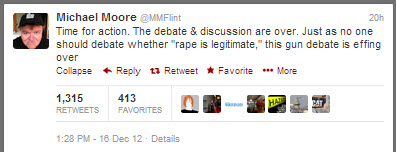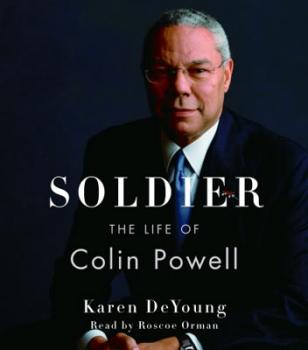The school shooting in Newtown, CT was a terrible tragedy. The loss of innocent life is simply heartrending. With what seems like a rash of mass shootings, politicians and political pundits have been asking whether meaningful gun control legislation is not overdue. Even President Obama has pledged to “use whatever power this office holds…in an effort aimed at preventing more tragedies like this. Because, what choice do we have?”

Sweedish sculpture of Non-Violence by Carl Fredrik Reuterswärd
What Choices Do We Have?
Let’s begin with Michael Moore, the maker of Bowling for Columbine. The day of the memorial service, he tweeted the following:

This is simply illogical. Moore is equating legal ownership of guns and rape. But let’s be clear: Rape is a crime. Murder is also a crime.
According to the National Criminal Justice Reporting Services, in the last year for which we have data, “victims age 12 or older experienced a total of 188,380 rapes or sexual assaults” in the United States.
Now, this is 188,380 too many, but let’s apply his reasoning to rape and his tweet might read: “The debate is over! Rape has to stop now. We need universal male castration!” To borrow from Madison, the cure is worse than the disease.
Thinking Like the Founding Fathers
Placing this discussion in context is important. I will not here rehash the common arguments from either side of the gun-control debate (e.g. Gun don’t kill people; people kill people or “Fewer people would be killed if guns were illegal.”) I want to focus here on the way that the Founding Fathers thought through such issues.
I wrote my doctoral dissertation on the way the Founding Fathers thought and reasoned during the Constitutional Convention and ratification debates. You may never have heard of me, but I know what I am talking about here. I borrowed Madison’s language from Federalist 10 because it is one of the clearest expositions of the Founders’ thinking about important political issues.
In Federalist 10, Madison was specifically was talking about factions (or what we call partisan politics). We don’t tend to like the bickering that goes on in Congress, but have you ever noticed that in countries where the lawmakers all have the same opinion, there is not a lot of freedom? When we consider the alternative, Congress does not look so bad.
Let’s examine how the Founding Fathers thought. Madison wrote:
There are two methods of curing the mischiefs of faction: the one, by removing its causes; the other, by controlling its effects.

James Madison – Chief Architect of the Constitution
There are again two methods of removing the causes of faction: the one, by destroying the liberty which is essential to its existence; the other, by giving to every citizen the same opinions, the same passions, and the same interests.
It could never be more truly said than of the first remedy, that it was worse than the disease. Liberty is to faction what air is to fire, an aliment without which it instantly expires. But it could not be less folly to abolish liberty, which is essential to political life, because it nourishes faction, than it would be to wish the annihilation of air, which is essential to animal life, because it imparts to fire its destructive agency.
The second expedient is as impracticable as the first would be unwise. (Federalist 10)
Let me recap.
Madison reasoned that you only have two choices: remove the causes or control its effects. If we try to remove the cause, we destroy our own liberty. The only viable solution is to control the effects.
The First Amendment Has A Dark Side Too
In the wake of this tragedy, the Westboro Family Cult (I refuse to dignify them with the term “Baptist Church” as this is an insult to Baptists everywhere) announced that it was going to protest at the funerals in Connecticut.
They protest against America, reveling in God’s judgement. They disrupt funerals of fallen soldiers and other solemn venues (e.g. the Holocaust museum as pictured below) in order to gain publicity and attract lawsuits when their rights are violated. It is a shakedown operation using protected non-profit “church” status and the First Amendment as foils for the venom that they inject into society.

Condemn them, ignore them, or encircle them with bikers as Patriot Guard Riders have done at funerals (in order to drown out their protests). But, do not compound the evil by attempting to remove the cause. As horrific as the the Westboro Family Cult is, it would be a far greater tragedy for the government to remove non-profit status for churches or restrict 1st Amendment religion or speech rights because of their abuses of the system.
The Solution
Madison concluded, “that the CAUSES of faction cannot be removed, and that relief is only to be sought in the means of controlling its EFFECTS.” Why? Because the “causes of faction are thus sown in the nature of man.”
Now this is point. If the problem is internal (e.g. the heart of man), external solutions will not work.
The Second Amendment
We think of guns as a useful means to ward off criminals. It is, but it is more than that. It is also a preventative measure to thwart future tyranny.
In its historical context, the Founders reasoned that the people would never be subdued by an oppressive government (theirs or another) as long as the people were armed and free.
 Liberals who rabidly defend the first amendment should apply the same logic to the second. We can destroy the liberty of citizens by removing firearms, but if the problem is the heart of man, strict controls on firearms will not cure what ails us and we will lose liberty in the process.
Liberals who rabidly defend the first amendment should apply the same logic to the second. We can destroy the liberty of citizens by removing firearms, but if the problem is the heart of man, strict controls on firearms will not cure what ails us and we will lose liberty in the process.
Guns in Newton, CT; machetes in Rwanda; improvised explosive devices (IED) in Iraq. What’s the common denominator? Evil in the Heart of man (not guns). Unless you can change the heart, your only remedy is to control the effects.
What do you think? I would like to know.
-Darin Gerdes, Ph.D.
December 17, 2012
UPDATE: Looking for solutions? Have a solution? Read my next article:
Gun Control: How to Think Like the Founding Fathers (Part II – Solutions)
_______________
Dr. Gerdes is the Director of the MBA Program at Charleston Southern University





















 They were banned by the Pope in 1139, but they were so effective that even the threat of eternal damnation did little to reduce the proliferation of crossbows in Europe.
They were banned by the Pope in 1139, but they were so effective that even the threat of eternal damnation did little to reduce the proliferation of crossbows in Europe.


 6. But what about the assault weapons used on 9/11? The AR-15s and M-16s used to subdue the passengers…oh wait, they used box cutters and claimed to have explosives.
6. But what about the assault weapons used on 9/11? The AR-15s and M-16s used to subdue the passengers…oh wait, they used box cutters and claimed to have explosives.


 “All societies of men must be governed in some way or other. The less they may have of stringent State Government, the more they must have of individual self-government. The less they rely on public law or physical force, the more they must rely on private moral restraint. Men, in a word, must necessarily be controlled, either by a power within them, or by a power without them; either by the Word of God, or by the strong arm of man; either by the Bible, or by the bayonet. It may do for other countries and other governments to talk about the State supporting religion. Here, under our own free institutions, it is Religion which must support the State.”
“All societies of men must be governed in some way or other. The less they may have of stringent State Government, the more they must have of individual self-government. The less they rely on public law or physical force, the more they must rely on private moral restraint. Men, in a word, must necessarily be controlled, either by a power within them, or by a power without them; either by the Word of God, or by the strong arm of man; either by the Bible, or by the bayonet. It may do for other countries and other governments to talk about the State supporting religion. Here, under our own free institutions, it is Religion which must support the State.” On the floor of the Virginia Ratification Convention, James Madison asked:
On the floor of the Virginia Ratification Convention, James Madison asked:




